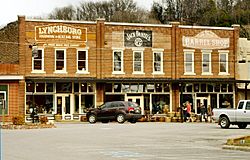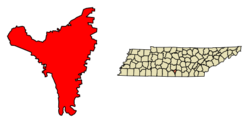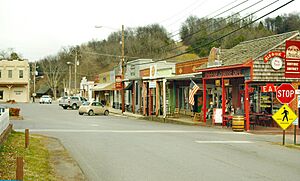Lynchburg, Tennessee facts for kids
Quick facts for kids
Lynchburg, Tennessee
|
|
|---|---|
|
Consolidated city-county
|
|

1913 commercial block on the courthouse square
|
|

Location of Lynchburg in Moore County, Tennessee.
|
|
| Country | |
| State | |
| County | Moore |
| Incorporated | 1841 |
| Area | |
| • Total | 130 sq mi (338 km2) |
| • Land | 129 sq mi (335 km2) |
| • Water | 1 sq mi (3 km2) |
| Elevation | 804 ft (245 m) |
| Population
(2020)
|
|
| • Total | 6,461 |
| • Density | 44/sq mi (17/km2) |
| Time zone | UTC−06:00 (Central (CST)) |
| • Summer (DST) | UTC−05:00 (CDT) |
| ZIP code |
37352
|
| Area code(s) | 931 |
| FIPS code | 47-44380 |
| GNIS feature ID | 1292342 |
Lynchburg is a city in the south-central part of Tennessee. It has a special type of government where the city and county are combined. This means Lynchburg's borders are the same as Moore County.
Lynchburg is famous for being the home of the Jack Daniel's distillery. This distillery makes a well-known Tennessee whiskey that is sold all over the world. Even though there's a distillery, Moore County is a "dry county." This means you can't buy alcohol in stores there. However, you can try whiskey at the distillery itself. In 2020, about 6,461 people lived in Lynchburg.
The city's downtown area is a special place. It is listed on the National Register of Historic Places. This means it's an important historical site.
Contents
Discovering Lynchburg's Past
Settlers first came to the Lynchburg area around the year 1801. The main road back then was called Main Street. It followed a creek called East Fork Mulberry Creek. Early homes were mostly in the western part of Lynchburg. Businesses and factories were built along the creek in the eastern part.
One of the first settlers, Thomas Roundtree, built a cotton mill near where the Jack Daniel's Distillery is today. By the 1830s, another settler, William P. Long, ran a gristmill (for grinding grain) and a cotton gin (for cleaning cotton). Lynchburg also had a large tannery, which made leather.
How Lynchburg Got Its Name
No one is completely sure how Lynchburg got its name. An old newspaper from 1876 said that an early settler named the city after his hometown, Lynchburg, Virginia. Another old guide from 1939 says the city was named after an early resident named Tom Lynch. A different article from 1972 suggests it was named after a "Judge Lynch." This judge was part of a group that met in the city after the War of 1812.
Lynchburg During the Civil War
During the American Civil War, most people in Lynchburg supported the Confederacy. A group of soldiers from Lynchburg formed Company E of the Confederate Army's 1st Tennessee Cavalry. Today, there is a monument on the lawn of the Moore County Courthouse. It honors the Confederate soldiers from the area.
Becoming the County Seat
In 1871, Moore County was created. It was made from parts of other nearby counties. Before this, Lynchburg was part of Lincoln County. In June 1873, Lynchburg was chosen as the county seat of Moore County. This was partly because it was in the middle of the new county.
The county leaders created a courthouse square along Main Street. This design was similar to the square in nearby Shelbyville. During this time, two schools were built: the Lynchburg Male and Female Institute and the Lynchburg Normal School. Many churches also built new, fancy buildings.
Growth and Distilleries
In the 1870s, Lynchburg was important for farming and trade. It was a key place for trading mules. The city also had many distilleries. By the 1880s, there were fifteen registered distilleries in Moore County. The most successful was Tom Eaton's Distillery. The second most successful was the famous Jack Daniel's. These distilleries bought a lot of corn from local farmers. The leftover corn mash was used to feed hogs and cattle.
Fire and Rebuilding
On December 4, 1883, a big fire destroyed almost half of Lynchburg. The courthouse and much of the courthouse square were burned. A new courthouse, which is the building still used today, was finished in 1885. A separate jail, now a museum, was built across the street in 1893.
In the early 1900s, more cars started using the roads. New state highways were built. This led to a business boom in Lynchburg. Many buildings around the courthouse square were built during this time. By 1920, Lynchburg had schools, churches, a newspaper, two banks, and many successful businesses.
Prohibition and Jack Daniel's Return
In 1909, a state law stopped the making of alcohol in Tennessee. This closed down all the distilleries in Lynchburg. Even though the national ban on alcohol (Prohibition) ended in 1933, it stayed in effect in Tennessee.
Lem Motlow (1869–1947), who was Jack Daniel's nephew and a state senator, worked to change these laws. In 1937, the state allowed alcohol to be made again. Motlow reopened the Jack Daniel's Distillery. In 1939, a new law allowed each county to decide if they wanted to sell alcohol.
Motlow State Community College
Motlow State Community College opened its campus in 1969. It was built on 187 acres of land. This land was given by Reagor Motlow and his family. The college is in the northern part of Moore County, which is now part of Lynchburg.
Lynchburg's Location and Surroundings
Lynchburg is located at 35°17′3″N 86°21′27″W.
The city covers about 130.4 square miles (337.7 square kilometers). Most of this area is land, with a small amount of water. Lynchburg is in a valley. This valley was formed by the East Fork Mulberry Creek. This creek is part of the Elk River system.
Tennessee State Route 55 is the main road in Lynchburg. It is known as Majors Boulevard. South of Lynchburg, this highway meets two other roads: Tennessee State Route 50 and Tennessee State Route 129.
| Climate data for Lynchburg, Tennessee, 1991–2020 normals, extremes 1999–present | |||||||||||||
|---|---|---|---|---|---|---|---|---|---|---|---|---|---|
| Month | Jan | Feb | Mar | Apr | May | Jun | Jul | Aug | Sep | Oct | Nov | Dec | Year |
| Record high °F (°C) | 77 (25) |
83 (28) |
85 (29) |
90 (32) |
93 (34) |
108 (42) |
107 (42) |
102 (39) |
99 (37) |
96 (36) |
87 (31) |
76 (24) |
108 (42) |
| Mean maximum °F (°C) | 68.4 (20.2) |
72.2 (22.3) |
79.6 (26.4) |
85.9 (29.9) |
90.1 (32.3) |
95.6 (35.3) |
96.2 (35.7) |
95.9 (35.5) |
92.8 (33.8) |
86.9 (30.5) |
77.3 (25.2) |
69.8 (21.0) |
97.5 (36.4) |
| Mean daily maximum °F (°C) | 48.5 (9.2) |
52.9 (11.6) |
61.8 (16.6) |
71.3 (21.8) |
79.4 (26.3) |
86.1 (30.1) |
89.3 (31.8) |
88.6 (31.4) |
83.2 (28.4) |
73.3 (22.9) |
61.1 (16.2) |
51.5 (10.8) |
70.6 (21.4) |
| Daily mean °F (°C) | 37.8 (3.2) |
40.9 (4.9) |
48.8 (9.3) |
57.2 (14.0) |
66.3 (19.1) |
74.2 (23.4) |
77.7 (25.4) |
76.4 (24.7) |
70.4 (21.3) |
58.9 (14.9) |
47.8 (8.8) |
40.4 (4.7) |
58.1 (14.5) |
| Mean daily minimum °F (°C) | 27.0 (−2.8) |
29.0 (−1.7) |
35.8 (2.1) |
43.2 (6.2) |
53.1 (11.7) |
62.3 (16.8) |
66.0 (18.9) |
64.3 (17.9) |
57.5 (14.2) |
44.6 (7.0) |
34.5 (1.4) |
29.3 (−1.5) |
45.5 (7.5) |
| Mean minimum °F (°C) | 8.4 (−13.1) |
12.9 (−10.6) |
19.5 (−6.9) |
28.6 (−1.9) |
36.6 (2.6) |
51.0 (10.6) |
55.9 (13.3) |
54.6 (12.6) |
44.1 (6.7) |
28.4 (−2.0) |
18.4 (−7.6) |
15.1 (−9.4) |
6.7 (−14.1) |
| Record low °F (°C) | −1 (−18) |
1 (−17) |
12 (−11) |
25 (−4) |
31 (−1) |
45 (7) |
50 (10) |
47 (8) |
35 (2) |
21 (−6) |
13 (−11) |
0 (−18) |
−1 (−18) |
| Average precipitation inches (mm) | 5.45 (138) |
5.21 (132) |
6.14 (156) |
5.59 (142) |
5.25 (133) |
5.55 (141) |
4.74 (120) |
4.63 (118) |
4.61 (117) |
3.55 (90) |
4.77 (121) |
6.76 (172) |
62.25 (1,580) |
| Average snowfall inches (cm) | 0.3 (0.76) |
0.6 (1.5) |
0.5 (1.3) |
0.0 (0.0) |
0.0 (0.0) |
0.0 (0.0) |
0.0 (0.0) |
0.0 (0.0) |
0.0 (0.0) |
0.0 (0.0) |
0.0 (0.0) |
0.1 (0.25) |
1.5 (3.81) |
| Average precipitation days (≥ 0.01 in) | 10.9 | 11.7 | 12.0 | 11.0 | 12.3 | 11.1 | 11.6 | 10.0 | 7.8 | 9.0 | 9.9 | 12.1 | 129.4 |
| Average snowy days (≥ 0.1 in) | 0.4 | 0.5 | 0.3 | 0.0 | 0.0 | 0.0 | 0.0 | 0.0 | 0.0 | 0.0 | 0.0 | 0.2 | 1.4 |
| Source 1: NOAA | |||||||||||||
| Source 2: National Weather Service (mean maxim/minima 2006–2020) | |||||||||||||
People of Lynchburg
| Historical population | |||
|---|---|---|---|
| Census | Pop. | %± | |
| 1880 | 345 | — | |
| 1890 | 500 | 44.9% | |
| 1900 | 417 | −16.6% | |
| 1910 | 408 | −2.2% | |
| 1920 | 365 | −10.5% | |
| 1930 | 380 | 4.1% | |
| 1940 | 390 | 2.6% | |
| 1950 | 401 | 2.8% | |
| 1960 | 396 | −1.2% | |
| 1970 | 538 | 35.9% | |
| 1980 | 668 | 24.2% | |
| 1990 | 4,721 | 606.7% | |
| 2000 | 5,740 | 21.6% | |
| 2010 | 6,319 | 10.1% | |
| 2020 | 6,461 | 2.2% | |
| Sources: | |||
In 2020, the census counted 6,461 people living in Lynchburg. In 2000, there were 5,740 people. These people lived in 2,211 households. About 1,686 of these were families.
Most people in Lynchburg are White (95.84%). About 2.72% are African American. A small number are Native American (0.19%) or Asian (0.14%). Some people are from other races (0.51%) or from two or more races (0.61%). About 0.78% of the people are Hispanic or Latino.
About 30.7% of households had children under 18. Most households (65.1%) were married couples. About 7.6% were single mothers. About 23.7% were not families.
The average household had 2.55 people. The average family had 2.95 people.
The ages of people in Lynchburg varied. About 23.3% were under 18. About 26.5% were between 25 and 44. About 15.5% were 65 or older. The average age was 40 years old.
The average income for a household in Lynchburg-Moore County was $36,591. For families, it was $41,484. About 9.6% of the people lived below the poverty line. This included 11.7% of those under 18. It also included 12.1% of those 65 or older.
Schools in Lynchburg
The schools in Lynchburg are part of the Lynchburg-Moore County Schools system.
- Lynchburg Elementary School teaches students from Pre-Kindergarten to 6th grade.
- Moore County High School teaches students from 7th to 12th grade.
Famous People from Lynchburg
Many interesting people have connections to Lynchburg:
- Jimmy Bedford (1940–2009) was the sixth master distiller at Jack Daniel's.
- Davy Crockett (1786–1836) was a famous American frontiersman. He lived in what is now Lynchburg from 1811 to 1813.
- Bill Dance (born 1940) is a well-known angler and TV host. He spent summers in Lynchburg as a child. He learned to fish in Mulberry Creek.
- Jasper Newton Daniel, also known as Jack Daniel (1846–1911), was the person who started the Jack Daniel's Distillery.
- Nathan "Nearest" Green (c.1820–?) was a former slave and a distiller. He taught Jack Daniel how to make whiskey and worked with him.
- Little Richard (1932–2020) was a famous American rock and roll artist. He lived in Lynchburg for a time.
- Bobby Majors (born 1949) was a football player for the Tennessee Volunteers and in the NFL.
- Johnny Majors (born 1935) is a famous football coach. He played for the University of Tennessee. He coached teams like the Iowa State Cyclones and the Pittsburgh Panthers. He also coached the Tennessee Volunteers.
- Shirley Majors (1913–1981) was the father of the Majors football family. He was a head coach at Sewanee: The University of the South.
- Lem Motlow (1869–1947) was Jack Daniel's nephew. He became the second owner of the Jack Daniel's Distillery. He also served in the Tennessee government.
- Reagor Motlow (1898–1978) was Jack Daniel's great-nephew. He owned the Jack Daniel's Distillery with his siblings. He also served in the Tennessee government.
- F. E. Riddle (born 1870) was an American lawyer born in Lynchburg. He later became a Justice of the Oklahoma Supreme Court.
See also
 In Spanish: Lynchburg (Tennessee) para niños
In Spanish: Lynchburg (Tennessee) para niños




